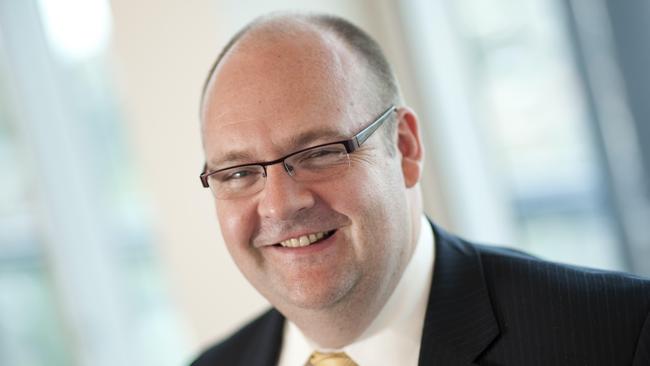How George Bush became my lifelong hero
George W. Bush said thousands of people had handwritten notes sent by his father. I know he’s right, because I’m one of them.

Every US president brings a quality to the office that seems to define them. Abraham Lincoln had a grace that turned away every insult, Franklin D. Roosevelt had a resilience that grew out of suffering, Harry S. Truman had the common sense of the everyday man, Richard Nixon carried a dark distrust of others, and Ronald Reagan had a sunny-sided optimism that infused his conservatism.
For George HW Bush, it was his capacity to build relationships. Asked why he should be president, his wife, Barbara, said “because George has thousands of friends”.
George W. Bush said thousands of people around the world had handwritten notes in their desk drawer sent by his father.
I know he’s right, because I’m one of them.
I first came across the elder Bush as a 13-year-old who was visiting a dentist in Sydney to be fitted with braces. I read a magazine profile on the underdog contender for the Republican presidential nomination. He seemed sturdier than the movie star Reagan and I declared, “I’m for Bush”.
It wasn’t Bush’s year to be the nominee, that would occur eight years later, but he was chosen as Reagan’s running mate.
I wrote to tell him of my disappointment he wasn’t president. A few weeks later, I arrived home from school to find an envelope inscribed “The Vice President. Washington”.
In the years that followed there were plenty more letters as I started corresponding with Bush.
He became a hero to me. My bedroom wall was plastered with a life-size poster of Bush wearing his navy bomber jacket, sitting in front of a stone wall looking out to sea.
I wagged school for the only time in my life when Bush visited Australia in 1982. I turned up at his Sydney hotel and asked to meet him. I was politely told the vice-president was busy but he’d be delighted to know that I dropped by. I knew what a fob-off was.
Shortly after, the vice-president arrived. I was the only person standing behind the police line. Holding American and Australian flags, I called out: “Mr Bush, I’m Paul Ritchie.” He turned to say: “Hey, Paul, good to see you.”
An official later came down and said: “The vice-president would like to meet you.”
With the brashness of a 14-year-old, I replied: “I told you so.”
In the presidential suite, I started to feel overawed and barely said a word. Bush kept the conversation going: “Paul, I want to thank you for your friendship. It means a lot to me. This is from me to you.”
He handed me two small boxes. In one was a gold vice-president tie-clip and in the other box was a vice-president key ring.
Over the years that followed there were replies and Christmas cards from Bush and eventually, an invitation to attend his inauguration as president. I’m sure I was at the furthest periphery of his world, but he was at the centre of mine.
He left a deep, abiding impression on my life. He guided my political philosophy to one that saw honour in public service; that treated politics as a means to an end, not an end in itself; and understood that civility and compromise were vital in modern democracies. He saw ideology as secondary to values; institutions were meant to serve others. While Reagan was a rare transformational president when America needed one, Bush was a transactional leader steadying the ship in a time of change. He delivered a long-term budget that provided the US with a decade of surpluses, passed the Americans with Disabilities Act, oversaw the end of the Cold War without a shot fired, built a 34-nation coalition to free Kuwait after its invasion by Iraq, and understood the responsibilities and the limits of US power.
Like no president since, he reached across the aisle and built bipartisan coalitions. Many argued it made him seem weak. With time, we have seen it as strength.
In World War II he was America’s youngest fighter pilot, joining the military on his 18th birthday. Bush was shot down by the Japanese and awarded the Distinguished Flying Cross. He was a war hero, congressman, CIA director, ambassador, vice-president, president and father of a president.
Still, for all of his achievements he was the most grounded of men.
In 2014, I lamented that despite his influence on my life, I never got a photo of him and I together.
So I wrote an email to his chief of staff telling my story.
She read the email to the 89-year-old, who said “get him up here”. I travelled to his summer home at Kennebunkport.
On that spring day, I spent time with a man who was without pretence, who was dealing with his infirmity with grace and dignity. He seemed at peace with his life, having worked out that politics and power is fleeting and what matters is the lives you have touched and the people you have loved.
The photos that surrounded him at Kennebunkport were not of the rich and powerful. They were of kids, grandkids and great-grandkids.
As the photographs were taken, I saw in the distance the small stone wall on that poster in my bedroom.
Until that visit, I had always called Bush my boyhood hero, I realised on that day that he was and will always be my lifelong hero. He will be missed.
Paul Ritchie is a speech writer for Prime Minister Scott Morrison



To join the conversation, please log in. Don't have an account? Register
Join the conversation, you are commenting as Logout